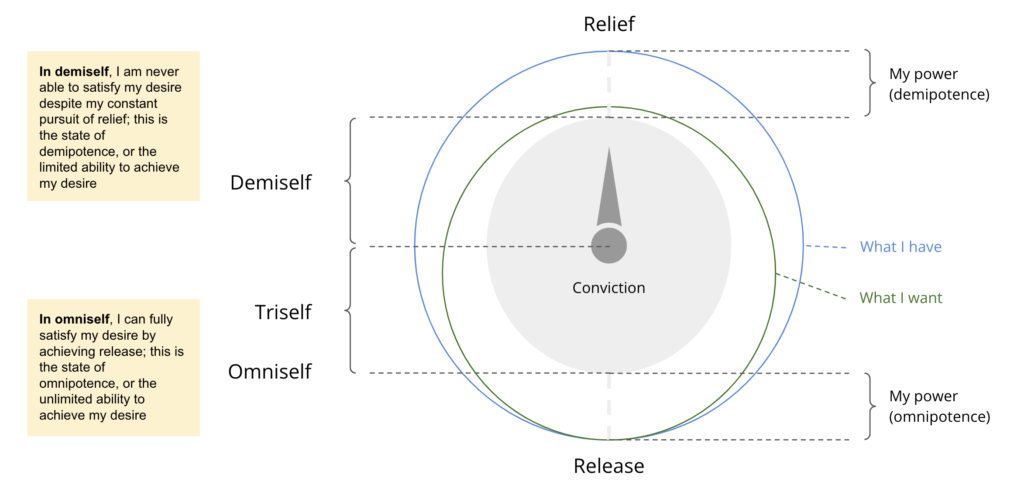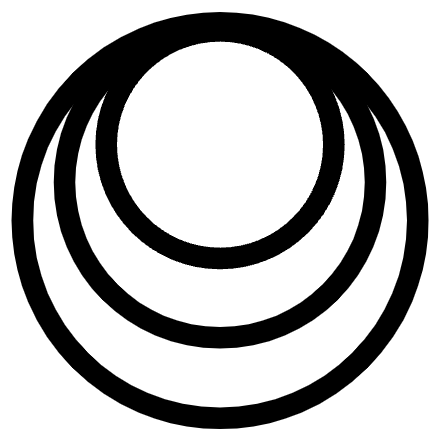A fundamental substance is one that cannot be further subdivided into smaller or simpler components. In demiself, I believe that I am an organized collection of cells composed of atomic particles with properties like length, mass, time, and charge. I also believe that I live in a world built of the same fundamental units.
What is the fundamental substance in triself?
The first step of triself is to restrict the subject of my inquiry to my direct experience. Whatever I can directly and instantly experience and validate is experiential, and anything I cannot is extraexperiential. Belief in ideas like atoms, particles, and science in general, are extraexperiential because they require an apparatus of conviction, education, expertise, instrumentation, methodology, authority, and time to reproduce and validate (aka, the conviction framework). The same goes for religious convictions, which have a similar structure of belief systems reinforced by authority.
Until the point at which I am directly observing atomic movement, it is entirely imaginary. And even then, my direct observation still implies an enormous, abstract set of beliefs I must continuously rehearse, refine, and revisit in order to make sense of my experience in atomic terms. I cannot achieve the state of “being” through them. I never experience “becoming” the atoms I am observing. I can only deepen my imagination of them. There is no end point to these conviction frameworks beyond more granular, specialized, fragmented knowledge. The most they can hope to achieve is an elusive, ever-unfinished synthesis that brings it all together. The “theory of everything”.
Experiential knowledge is different in every important way. Unlike extraexperiential frameworks where I can never be the absolute authority, in an experiential framework, I am the only and final authority. The full range of phenomena I want to explain is limited to my experience only. I do not seek to observe or understand the extraexperiential; I only seek to better express and understand the experiential and then believe in my own absolute authority over it. My final objective in triself is to know to be.
What then is the fundamental substance of my experiential existence? What is always present at the very foundation of my experience? The most primitive substance of my existence is not chemical, mechanical, mental, or spiritual. The most fundamental unit is desire. My desire is at the absolute center of everything I experience. Everything I believe, see, touch, taste, feel, like, dislike, and experience extends from the desire that precipitates that experience.
From the moment I awaken to the moment my eyes close and I fall asleep, I desire. Desire is the fuel upon which my entire experience runs, and the compound of which my entire experience is built. My desire is deeply embedded in all parts of my being and drives every single activity and behavior of the people I manifest in the thirdself. Nothing moves or changes unless I execute some action or behavior in response to a desire I harbor.
But desire is not a neutral fluid or substance. Desire has a definite polarity: it seeks that which ends it. Desire seeks to end itself the way that water seeks its own level. My ultimate desire is to not desire anymore. My desire is the measure of my illness. The more I desire anything other than the end of my desire, the more ill I am. The more I feed my desire a diet of stimulation, pleasure, aspiration, and distraction, the sicker I become.
In that way, my desire is the fuel source within. How I use that fuel source and where I direct it is determined by my conviction. My conviction is my set of beliefs and values I maintain that are oriented toward the satisfaction of my desire. In that way, my conviction is like a compass, and it can lead me either toward more pain and suffering, or toward peace.
As long as I am confused about what I truly desire, my convictions will lead me deeper into the second place toward relief. I will not understand my nature, but will know that I am in pain, and will seek only to numb that pain through the pleasures, comforts, and distractions of the second place. As I begin to awaken to the fact that nothing in the second place ever satisfies my desire, I will begin to question my direction and rediscover my true desire for release from my desire, not transitory relief.
In rediscovering that my desire seeks its own end, I also learn about the third aspect of the fundamental substance: my power. If desire is my state, conviction is my orientation, then power is my achievement. If I seek relief then my power to achieve will always be limited in terms of what I seek because relief is, by its nature, transitory. Desire given to the second place will only expand, unmet. My unfulfilled desire can contract in the sense that I can give up in disappointment, but this only compounds the pain as it becomes an open wound without any hope of healing. The pursuit of relief will only prolong and expand my pain in the way that oxygen will only feed a fire.
The only way to reduce my suffering is to reorient toward release, away from relief. Release is the withdrawal from desire in the second place toward the first place. I do not end my desire; I redirect it. I do not end my attachments; I redirect them. And for that, I must deconstruct and rebuild the values and beliefs that form my conviction.

Combined, desire, conviction, and power form the fundamental mechanics of my emanation. If I can understand how these mechanics work, then I can overcome the suffering of desire rather than continue to feed it a diet of distraction and stimulation. My ultimate desire is to end my desire; my desire seeks its own end. To accomplish this I must redirect it away from the relief of the second place and toward the release of the first place.
…
